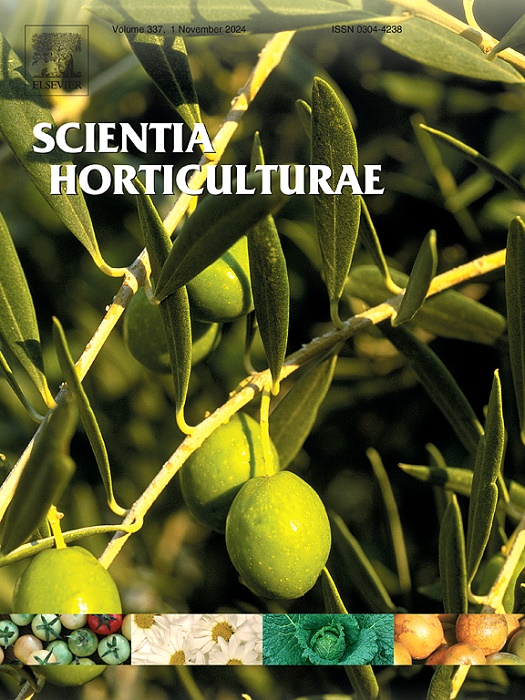Overexpression of BoSULTR1;1/BoSULTR1;2 promotes glucosinolate accumulation and enhances stress tolerance in broccoli
IF 3.9
2区 农林科学
Q1 HORTICULTURE
引用次数: 0
Abstract
SULTR1;1 and SULTR1;2 are high-affinity sulphate transporters that are crucial for sulphate uptake from the soil. Nevertheless, the impact of sulphate absorption mediated by SULTR1;1 and SULTR1;2 on the metabolism of sulfur-containing compounds as well as the physiological processes they are involved in is not yet fully understood. In this study, we cloned the BoSULTR1;1 and BoSULTR1;2 genes from broccoli (Brassica oleracea var. italica). Overexpression of BoSULTR1;1/BoSULTR1;2 in Arabidopsis enhanced sulphate uptake and assimilation, without accumulating the sulphate assimilation product cysteine. Overexpression of BoSULTR1;1/BoSULTR1;2 also triggered the upregulation of genes responsible for the biosynthesis of another two sulfur-containing compounds, methionine and glutathione, without leading to their accumulation, rather, it led to the accumulation of the downstream secondary metabolites, glucosinolates. Under normal growth conditions, BoSULTR1;1 and BoSULTR1;2 are specifically expressed in the roots. However, certain treatments such as wounding, PEG 6000-simulated drought stress, and methyl jasmonate can induce the expression of the two genes in the aerial parts, indicating that BoSULTR1;1/BoSULTR1;2 may not only regulate sulfur uptake but also potentially control the distribution of sulphate in the above-ground tissues and participate in defense against certain adverse environmental cffigonditions. Given that glucosinolates are crucial defense compounds against both biotic and abiotic stresses, we detected stress tolerance in plants overexpressing BoSULTR1;1/BoSULTR1;2. The results revealed that overexpression of BoSULTR1;1/BoSULTR1;2 in Arabidopsis significantly enhanced resistance to Helicoverpa armigera, bacteria pathogen Pseudomonas syringae pv. tomato DC3000 and drought stress. Similar results were observed when BoSULTR1;1/BoSULTR1;2 was overexpressed in broccoli, indicating a conservative role of BoSULTR1;1/BoSULTR1;2 in Brassicaceae plants. In conclusion, BoSULTR1;1 and BoSULTR1;2 are effective candidate genes for enhancing sulfur uptake and improving stress resistance in Brassicaceae plants such as broccoli. Their potential applications in agricultural production are highly promising.
BoSULTR1;1/BoSULTR1;2的过表达促进了芥子油苷的积累,增强了西兰花的抗逆性
SULTR1;1和SULTR1;2是高亲和力的硫酸盐转运体,对从土壤中吸收硫酸盐至关重要。然而,由SULTR1;1和SULTR1;2介导的硫酸盐吸收对含硫化合物代谢及其参与的生理过程的影响尚不完全清楚。本研究从西兰花(Brassica oleracea var. italica)中克隆了BoSULTR1;1和BoSULTR1;2基因。在拟南芥中,BoSULTR1;1/BoSULTR1;2的过表达增强了硫酸盐的吸收和同化,而不积累硫酸盐同化产物半胱氨酸。BoSULTR1;1/BoSULTR1;2的过表达也触发了另外两种含硫化合物甲硫氨酸和谷胱甘肽的生物合成基因的上调,但没有导致它们的积累,而是导致了下游次级代谢物硫代葡萄糖苷的积累。在正常生长条件下,BoSULTR1;1和BoSULTR1;2在根中特异性表达。然而,伤害、PEG 6000模拟干旱胁迫和茉莉酸甲酯等处理均可诱导这两个基因在地上部分的表达,这表明BoSULTR1;1/BoSULTR1;2不仅可以调节硫的吸收,还可能控制地上组织中硫酸盐的分布,参与对某些不利环境条件的防御。考虑到硫代葡萄糖苷是抵抗生物和非生物胁迫的重要防御化合物,我们检测了过表达BoSULTR1;1/BoSULTR1;2的植物的抗逆性。结果表明,BoSULTR1;1/BoSULTR1;2在拟南芥中过表达可显著增强对棉铃虫Helicoverpa armigera、丁香假单胞菌pv的抗性。番茄DC3000和干旱胁迫。当BoSULTR1;1/BoSULTR1;2在花椰菜中过表达时,也观察到类似的结果,说明BoSULTR1;1/BoSULTR1;2在芸苔科植物中具有保守作用。综上所述,BoSULTR1;1和BoSULTR1;2是提高西兰花等芸苔科植物硫吸收和抗逆性的有效候选基因。它们在农业生产中的应用前景十分广阔。
本文章由计算机程序翻译,如有差异,请以英文原文为准。
求助全文
约1分钟内获得全文
求助全文
来源期刊

Scientia Horticulturae
农林科学-园艺
CiteScore
8.60
自引率
4.70%
发文量
796
审稿时长
47 days
期刊介绍:
Scientia Horticulturae is an international journal publishing research related to horticultural crops. Articles in the journal deal with open or protected production of vegetables, fruits, edible fungi and ornamentals under temperate, subtropical and tropical conditions. Papers in related areas (biochemistry, micropropagation, soil science, plant breeding, plant physiology, phytopathology, etc.) are considered, if they contain information of direct significance to horticulture. Papers on the technical aspects of horticulture (engineering, crop processing, storage, transport etc.) are accepted for publication only if they relate directly to the living product. In the case of plantation crops, those yielding a product that may be used fresh (e.g. tropical vegetables, citrus, bananas, and other fruits) will be considered, while those papers describing the processing of the product (e.g. rubber, tobacco, and quinine) will not. The scope of the journal includes all horticultural crops but does not include speciality crops such as, medicinal crops or forestry crops, such as bamboo. Basic molecular studies without any direct application in horticulture will not be considered for this journal.
文献相关原料
公司名称
产品信息
索莱宝
MDA assay kit
索莱宝
GSH assay kit
索莱宝
Cys Content Assay kit
 求助内容:
求助内容: 应助结果提醒方式:
应助结果提醒方式:


